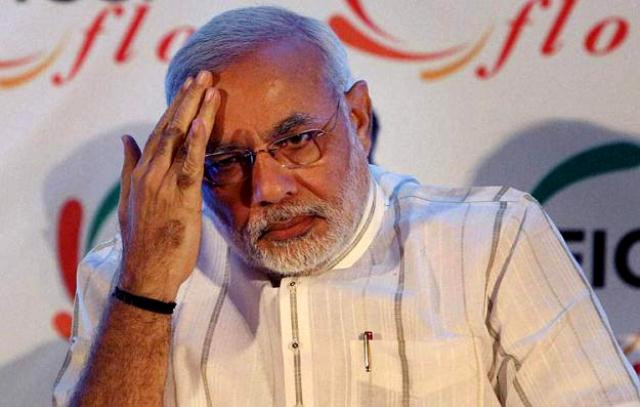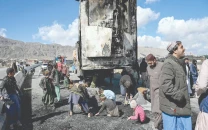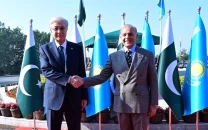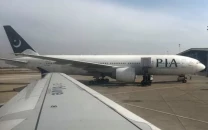The flaws in India’s plan to diplomatically isolate Pakistan
Terror can’t be defeated without cooperation; policy also affects India’s global image, plan to become economic...

Indian premier Narendra Modi. PHOTO: AFP
Luckily for Pakistan, the parade was not the only time when Modi’s wishful plan to corner Pakistan fell flat on its face. In October last year, India faced a setback over its policy of isolating Pakistan at the BRICS Summit in Goa, attended by head of states from Brazil, Russia, India, China and South Africa. Given its friendly relations with Pakistan, China opposed the Indian stance and refused to buy Modi’s remarks of “mothership of terrorism” against Islamabad. Similarly, India had lobbied in the US to sanction Pakistan for sponsoring terrorism, but the global power refused as it acknowledges Pakistan has been engaged in a serious fight against terrorism. In September, New Delhi also tried to interrupt Pakistan-Russia ties and urged Moscow to not carry out a joint military exercise in Pakistan. Nevertheless, the Indian plea was frustrated by Moscow.
Ironically, even with all these setbacks, New Delhi has been claiming that it is succeeding in its efforts against Pakistan.
Why Modi’s policy is harmful to India itself
Despite its failure to isolate Pakistan, India is still continuing with its blame game and arrogantly avoiding dialogue over outstanding issues including Kashmir. Practically speaking, such a policy is not even in the interest of New Delhi for several reasons.
Firstly, New Delhi wants to establish itself as an economic power in the region. Such dreams can never be realised in an environment where Pakistan and India – two nuclear-armed nations - are in conflict. Moreover, in the case of better ties, Pakistan can interconnect the country with other regions through land and sea routes that are very important for corporate India.
Secondly, conflicts never resolve issues or defeat terrorism, which is a serious threat to the entire region. It is the terrorists India needs to isolate, not Pakistan; the conflict between the two countries will only strengthen extremism both in India and Pakistan. What is needed is joint efforts and cooperation between the two countries; refusing to talk will only help violence to spread across the region engulfing India as well eventually.
In the last two years, India has reportedly arrested dozens of suspected global militants who allegedly wanted to establish their cells in the country. The country has also been facing the threat of terror attacks for long. Similarly, Pakistan itself is one of the worst victims of terrorism with about 22,000 civilians and 6,600 soldiers killed. In addition, the country has incurred losses worth Rs12.3 trillion in the war on terror, besides the destruction of its infrastructures in different parts of the country. It is only logical for the two countries to come together for peace and development.
Thirdly, India’s strategy has reflected negatively on its own image. Last year, Russian diplomat Zamir Kabulov praised the speech of foreign policy adviser Sartaj Aziz at the Heart of Asia Conference in Amritsar as "a friendly one" and cautioned the participants against indulging in a blame game over the critical issues of terrorism and peace in Afghanistan in which everyone has an important stake. Similarly, China and the US have opposed Modi’s stance against Pakistan.
Can Pakistan be isolated?
For the global community, Pakistan’s role against terrorism is vital as it is connected to the security situation in China, India, Middle East and Central Asia. The world also realises the importance of Pakistan for stabilisation and reconciliation in Afghanistan.
Economically, Pakistan is considered important for interconnecting Central Asia and South Asia as desired by the international community especially China, Russia and the US. Its sea and land routes can interconnect different regions of the world in the future as well; apart from the much-popular China-Pakistan Economic Corridor, the Central Asia Regional Economic Cooperation Program - to interconnect Europe and the Middle East with Central Asia and South Asia – plans to make use of Pakistani ports.
Additionally, Pakistan’s role in South Asian Association for Regional Cooperation, Economic Cooperation Organisation, Organisation of Islamic Cooperation, Shanghai Cooperation Organisation, and other regional arrangements can never be overlooked. The stabilisation of South Asia region is essential for global connectivity, peace and development and no country in the world can afford to isolate Pakistan and further destabilise the region.
Imdad Hussain is an Islamabad-based journalist specialising in diplomatic and security issues.



















COMMENTS
Comments are moderated and generally will be posted if they are on-topic and not abusive.
For more information, please see our Comments FAQ